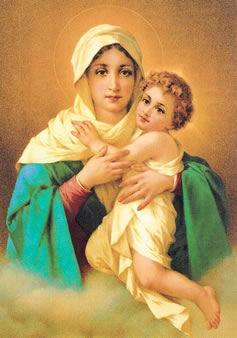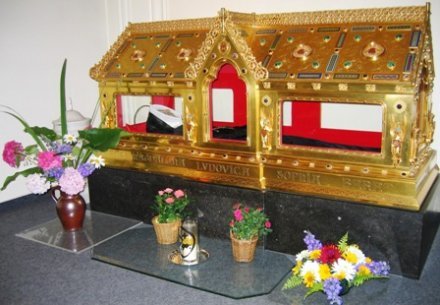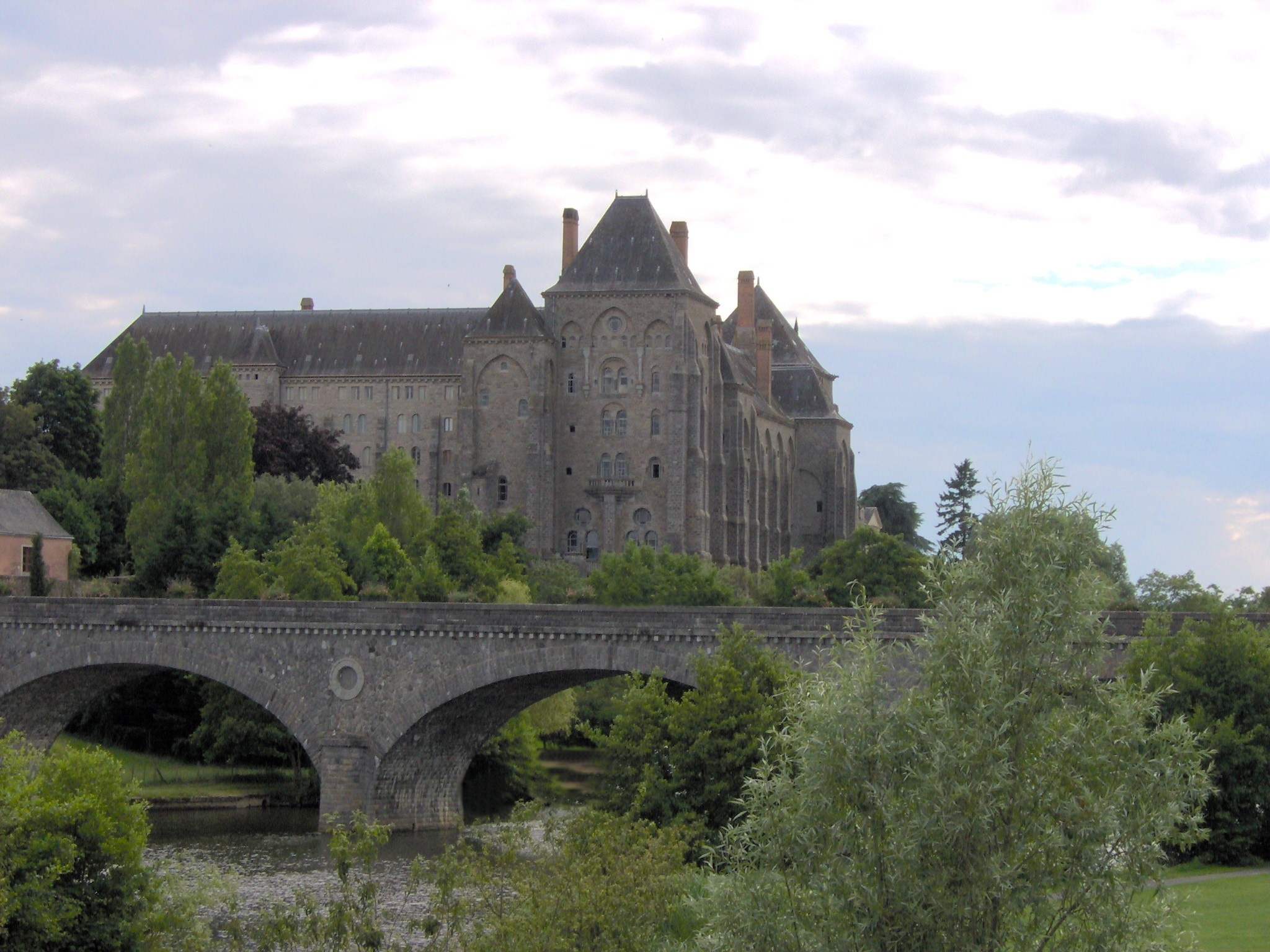|
Saint-Étienne-des-Grès, Paris
Saint-Étienne-des-Grès was a church and parish in Paris, France, formerly located in the Latin Quarter on the Rue Saint-Jacques. History Saint-Étienne-des-Grès was located on the Rue Saint-Jacques, on the site of the present Faculty of Law. It was one of the early centers of Christianity in Paris; it stood on a site said to be that of an oratory which was erected by St. Denis to St. Stephen. Its foundation dates to around the sixth century. Saint-Étienne was one of five Merovingian churches marking the road from Paris to Orleans. The original church was destroyed by the Vikings, but rebuilt in the 11th century. Canons were installed in 1045 to serve the church and pray for the king. It became a parish sometime before 1080, but the parish was absorbed by St. Benedict's between 1195 and 1205. The Chapter existed until 1790. The collegiate church was demolished in 1792. Notre Dame de Bonne Délivrance The church notably contained a Black Madonna, the ''Notre Dame de Bonne ... [...More Info...] [...Related Items...] OR: [Wikipedia] [Google] [Baidu] |
Memorare
Memorare ("Remember, O Most Gracious Virgin Mary") is a Catholic prayer seeking the intercession of the Blessed Virgin Mary. It first appears as part of a longer 15th-century prayer, "Ad sanctitatis tuae pedes, dulcissima Virgo Maria." Memorare, from the Latin "Remember," is frequently misattributed to the 12th-century Cistercian monk Saint Bernard of Clairvaux, apparently due to confusion with its 17th-century popularizer, Father Claude Bernard, who stated that he learned it from his own father. Modern version The modern version is taken from that indulgenced by Pope Pius IX in 1846, Raccolta, #339 (S. C. Ind., Dec. 11, 1846; S. P. Ap., Sept. 8, 1935) Encr. Ind. #32: Memorare, O piissima Virgo Maria, a saeculo non esse auditum, quemquam ad tua currentem praesidia, tua implorantem auxilia, tua petentem suffragia, esse derelictum. Ego tali animatus confidentia, ad te, Virgo Virginum, Mater, curro, ad te venio, coram te gemens peccator assisto. Noli, Mater Verbi, verba mea de ... [...More Info...] [...Related Items...] OR: [Wikipedia] [Google] [Baidu] |
Destroyed Churches In France
*
{{disambiguation ...
Destroyed may refer to: * ''Destroyed'' (Sloppy Seconds album), a 1989 album by Sloppy Seconds * ''Destroyed'' (Moby album), a 2011 album by Moby See also * Destruction (other) * Ruined (other) Ruins are the remains of man-made architecture. Ruins or ruin may refer to: History *The Ruin (Ukrainian history), a period in Ukrainian history after the death of Bohdan Khmelnytsky in 1657 Geography *Ruin, Iran, a village in North Khorasan Pr ... [...More Info...] [...Related Items...] OR: [Wikipedia] [Google] [Baidu] |
Religion And The French Revolution
Religion is a range of social- cultural systems, including designated behaviors and practices, morals, beliefs, worldviews, texts, sanctified places, prophecies, ethics, or organizations, that generally relate humanity to supernatural, transcendental, and spiritual elements—although there is no scholarly consensus over what precisely constitutes a religion. It is an essentially contested concept. Different religions may or may not contain various elements ranging from the divine, sacredness, faith,Tillich, P. (1957) ''Dynamics of faith''. Harper Perennial; (p. 1). and a supernatural being or beings. The origin of religious belief is an open question, with possible explanations including awareness of individual death, a sense of community, and dreams. Religions have sacred histories, narratives, and mythologies, preserved in oral traditions, sacred texts, symbols, and holy places, that may attempt to explain the origin of life, the universe, and other phenomena. Religiou ... [...More Info...] [...Related Items...] OR: [Wikipedia] [Google] [Baidu] |
Roman Catholic Churches In The 5th Arrondissement Of Paris
Roman or Romans most often refers to: *Rome, the capital city of Italy *Ancient Rome, Roman civilization from 8th century BC to 5th century AD *Roman people, the people of Roman civilization *Epistle to the Romans, shortened to Romans, a letter written by Paul, found in the New Testament of the Christian Bible * Ar-Rum (), the 30th sura of the Quran. Roman or Romans may also refer to: Arts and entertainment Music *Romans (band), a Japanese pop group * ''Roman'' (album), by Sound Horizon, 2006 * ''Roman'' (EP), by Teen Top, 2011 *"Roman (My Dear Boy)", a 2004 single by Morning Musume Film and television *Film Roman, an American animation studio * ''Roman'' (film), a 2006 American suspense-horror film * ''Romans'' (2013 film), an Indian Malayalam comedy film * ''Romans'' (2017 film), a British drama film * ''The Romans'' (''Doctor Who''), a serial in British TV series People *Roman (given name), a given name, including a list of people and fictional characters *Roman (surname), ... [...More Info...] [...Related Items...] OR: [Wikipedia] [Google] [Baidu] |
Neuilly-sur-Seine
Neuilly-sur-Seine (; 'Neuilly-on-Seine'), also known simply as Neuilly, is an urban Communes of France, commune in the Hauts-de-Seine Departments of France, department just west of Paris in France. Immediately adjacent to the city, north of the Bois de Boulogne, the area is composed of mostly select residential neighbourhoods, as well as many corporate headquarters and a handful of foreign embassies. One of the most affluent areas of France, it is the wealthiest and most expensive suburb of Paris. Together with the 16th arrondissement of Paris, 16th and 7th arrondissement of Paris, the town of Neuilly-sur-Seine forms the most affluent residential area in France. , it is the commune with the fourth highest median per capita income (€52,570 per year) in France. History Originally, Pont de Neuilly was a small hamlet under the jurisdiction of Villiers, a larger settlement mentioned in medieval sources as early as 832 and now absorbed by the commune of Levallois-Perret. It was ... [...More Info...] [...Related Items...] OR: [Wikipedia] [Google] [Baidu] |
Reign Of Terror
The Reign of Terror (French: ''La Terreur'', literally "The Terror") was a period of the French Revolution when, following the creation of the French First Republic, First Republic, a series of massacres and Capital punishment in France, numerous public executions took place in response to the Federalist revolts, revolutionary fervour, Anti-clericalism, anticlerical sentiment, and accusations of treason by the Committee of Public Safety. While terror was never formally instituted as a legal policy by the Convention, it was more often employed as a concept. Historians disagree when exactly "the Terror" began. Some consider it to have begun in 1793, often giving the date as 5 September or 10 March, when the Revolutionary Tribunal came into existence. Others cite the earlier September Massacres in 1792, or even July 1789 when the first killing of the revolution occurred. Will Durant stated that "strictly, it should be dated from the Law of Suspects, September 17, 1793, to the e ... [...More Info...] [...Related Items...] OR: [Wikipedia] [Google] [Baidu] |
Madeleine Sophie Barat
Madeleine Sophie Barat, RSCJ, (12 December 1779 – 25 May 1865), is a French saint of the Catholic Church who founded the Society of the Sacred Heart, a worldwide religious institute of educators. Early life and family Barat was born on the night of 12 December 1779, in Joigny, Early modern France, France, next door to a house fire at a neighbour’s home. The stress and the terror of the fire caused Sophie's mother, Madeleine Fouffé Barat (1740–1822), then pregnant with her third child, to go into labour. Born two months premature, Madeleine Sophie was considered so fragile that she was baptised early the next morning in Sainy Thibault Church, just a few yards from the Barat family home. Although her parents had arranged godparents in advance, there was no time to call them to the church and so at five o'clock on the morning of 13 December 1779, Louise-Sophie Cédor, a local woman on her way to early Mass, and Sophie's older brother, Louis, stood in as her godparents. Barat ... [...More Info...] [...Related Items...] OR: [Wikipedia] [Google] [Baidu] |
Prosper Guéranger
Prosper Louis Pascal Guéranger (; 4 April 1805 – 30 January 1875) was a French priest and Benedictine monk, who served for nearly 40 years as the abbot of the monastery of Solesmes (which he founded among the ruins of a former priory at Solesmes). Through the new Abbey of Solesmes, he became the founder of the French Benedictine Congregation (now the Solesmes Congregation), which re-established Benedictine monastic life in France after it had been wiped out by the French Revolution. Guéranger was the author of '' The Liturgical Year'', a popular commentary which covers every day of the Catholic Church's liturgical cycles in 15 volumes. He was well regarded by Pope Pius IX, and was a proponent of the dogmas of the Immaculate Conception and of papal infallibility. Guéranger is credited with reviving the Benedictine Order in France, and with promoting the adoption of the liturgical books of the Roman Rite throughout France, an important element in the Liturgical Movement, ... [...More Info...] [...Related Items...] OR: [Wikipedia] [Google] [Baidu] |
John Bosco
John Melchior Bosco, Salesians of Don Bosco, SDB (; ; 16 August 181531 January 1888), popularly known as Don Bosco or Dom Bosco (International Phonetic Alphabet, IPA: ), was an Italian Catholic priest, educator and writer. While working in Turin, where the population suffered many of the ill effects of industrialization and urbanization, he dedicated his life to the betterment and education of street children, juvenile delinquents, and other disadvantaged youth. He developed teaching methods based on love rather than punishment, a method that became known as the Salesian Preventive System. A follower of the spirituality and philosophy of Francis de Sales, Bosco was an ardent devotee of the Mary, mother of Jesus, Virgin Mary under the title Mary Help of Christians. He later dedicated his works to de Sales when he founded the Salesians of Don Bosco, based in Turin. Together with Maria Domenica Mazzarello, he founded the Institute of the Daughters of Mary Help of Christians, now ... [...More Info...] [...Related Items...] OR: [Wikipedia] [Google] [Baidu] |
Jean-Jacques Olier
Jean-Jacques Olier, S.S. (20 September 1608 – 2 April 1657) was a French Catholic priest and the founder of the Sulpicians. He also helped to establish the Société Notre-Dame de Montréal, which organized the settlement of a new town called Ville-Marie (now Montreal) in the colony of New France. Early life Olier was born in Paris, but the family moved to Lyon, where his father had become a judge. There he was given a thorough education in the classics at the local Jesuit college (1617–25). He was encouraged to become a priest by Francis de Sales, who predicted his sanctity and great services to the Catholic Church. In preparation for this career, Olier first studied philosophy at the College of Harcourt in Paris, then scholastic theology and patristics at the College of Sorbonne. He preached during this period, by virtue of a benefice which his father had obtained for him. The young student became a man of great ambition; he also frequented fashionable society, wh ... [...More Info...] [...Related Items...] OR: [Wikipedia] [Google] [Baidu] |
Father Claude Bernard
Father Claude Bernard (December 23, 1588 – March 23, 1641) was a French Roman Catholic priest who was active in ministry to prisoners and criminals, especially those condemned to death. Known as "le pauvre prêtre" ("the poor priest"), he is primarily remembered as the popularizer of the ''Memorare'', over 200,000 copies of which he distributed by leaflets printed in various languages. Life Claude Bernard was born at Dijon 23 December 1588. His father was a distinguished lawyer, and filled successively offices of honour and responsibility. Young Bernard was educated at the Jesuit College of Dole and was remarked for his brilliant imagination and wit. Pierre Le Camus, Bishop of Belley, urged him to enter the priesthood, but he declined, saying that he preferred the life of a poor gentleman to that of a poor priest. Shortly afterwards he went to Paris as a protégé of M. de Bellegarde, Governor of Bourgogne. For a while the social life of the capital attracted him; gradually, howeve ... [...More Info...] [...Related Items...] OR: [Wikipedia] [Google] [Baidu] |





